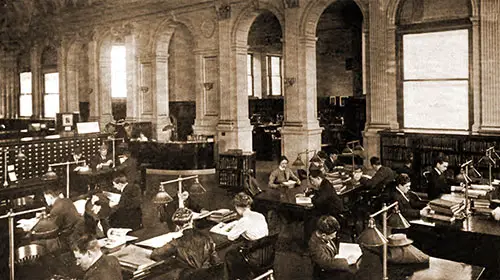Educational and Professional Opportunities for Discharged Servicemen - 1919

Students at the Carnegie Library of Pittsburg Reference Room, 1918. GGA Image ID # 19702b5651
Professional Men
Professional and scientific societies are addressing themselves to the task of reabsorbing professional men through special organizations created for the purpose.
Among those maintaining such agencies are The American Chemical Society, The American Institute of Mining Engineers The American Society of Mechanical Engineers, The American Society of Civil Engineers, and The American Society of Automotive Engineers. The officer or man seeking a place need not be a member of the society which covers his profession.
Those still in the service, or who may have been discharged, and who are interested in the profession of pharmacy, should address the advisory committee of The American Pharmaceutical Society for Soldier and Sailor Pharmacists, 1005 Mercantile Library Building, Cincinnati, Ohio.
The association is in a position to help find positions in any State in the Union, and to direct attention to opportunities to engage in business, and to opportunities and means to carry on and finish a pharmaceutical education.
College Men
To the man whose college or university life has been broken by the war there are but two words to say: Get back. Don't let a Gypsy heel, or the smell of wood fires, or the call of a winding road lead you astray until you've finished college.
There'll be time enough when that's done to go Gypsying. After the Civil War, and even after the fracas of 1898 there were ever so many who thought it was too late to go back. Talk to them about it. They'll tell you it was the mistake of their lives.
Beaucoup for Nothing
Consider books as friends of deep experience and good judgment. While you are aboard ship or in the demobilization camp, you will find in the American Library Association Building, and after you get home you will find in the public library, the book you want on automobiles, gas engines, engineering, salesmanship, plumbing, carpentry, or any other of the myriad of subjects which engage a man's endeavors. Use your library as a bureau of information.
If your library does not own the book you want, ask the librarian to borrow it for you from the State Library or the State Library Commission, or some other source known to him. It is possible to get any kind of a book. There is no country in the world organized in this respect like the United States.
If there is no public library in your town, write to your State Library Commission, or to The American Library Association, 78 East Washington Street, Chicago, Ill. The A. L. A. knows the book game.
Library service is free. This is a tip. Go to it.
Educational Opportunities
To the man with the inspiration to possess the advantages of a higher education there are many opportunities beckoning. Ask the representatives of the U. S. Employment Service, the welfare agencies and libraries at any of the camps or demobilization centers for a copy of Higher Education Circular No. 12, December, 1918.
Failing to obtain it from these sources, write direct to The Bureau of Education, Department of the Interior, Washington, D. C., and request that it be sent to you.
This circular contains dope on over 60 percent of colleges for men in the United States who wish to do their part by the man who has been doing his part.
It will tell you the names and locations of these colleges, the courses leading to different degrees, the dates at which returned servicemen may enter degree courses, the cost of tuition, if any, the number of scholarships, and the amount of each available for discharged soldiers and sailors, the number of short courses and their length, the date of beginning and preliminary educational requirements, professional courses (law, medicine, pharmacy, dentistry, veterinary medicine and other), the estimated weekly cost of housing and subsistence in barracks or outside, the chances of self-support and the name of the college official to whom correspondence should be addressed.
The United States Commissioner of Education puts it to you in these words: "A man who in ordinary times would not be admitted to a reputable college because of defective preparation now has a chance."
All States and many of the larger cities maintain public normal schools, in which teachers are trained for service in the elementary schools and as supervisors and teachers of special branches. Tuition at public normal schools is generally free.
The course of study for graduates of high schools is generally two years. Completion of this course means eligibility to State certificates.
For students who have had less than finished high school education many normal schools provide longer courses, three or four years in all, designed to cure the deficiencies in high school education as well as to give professional training.
Provisions are commonly made by normal schools to enable students to earn sufficient money to pay for part of their living expenses.
William Brown Meloney. Where Do We Go From Here? - This Is the Real Dope. Baltimore: Thomsen-Ellis Press, 1919.
